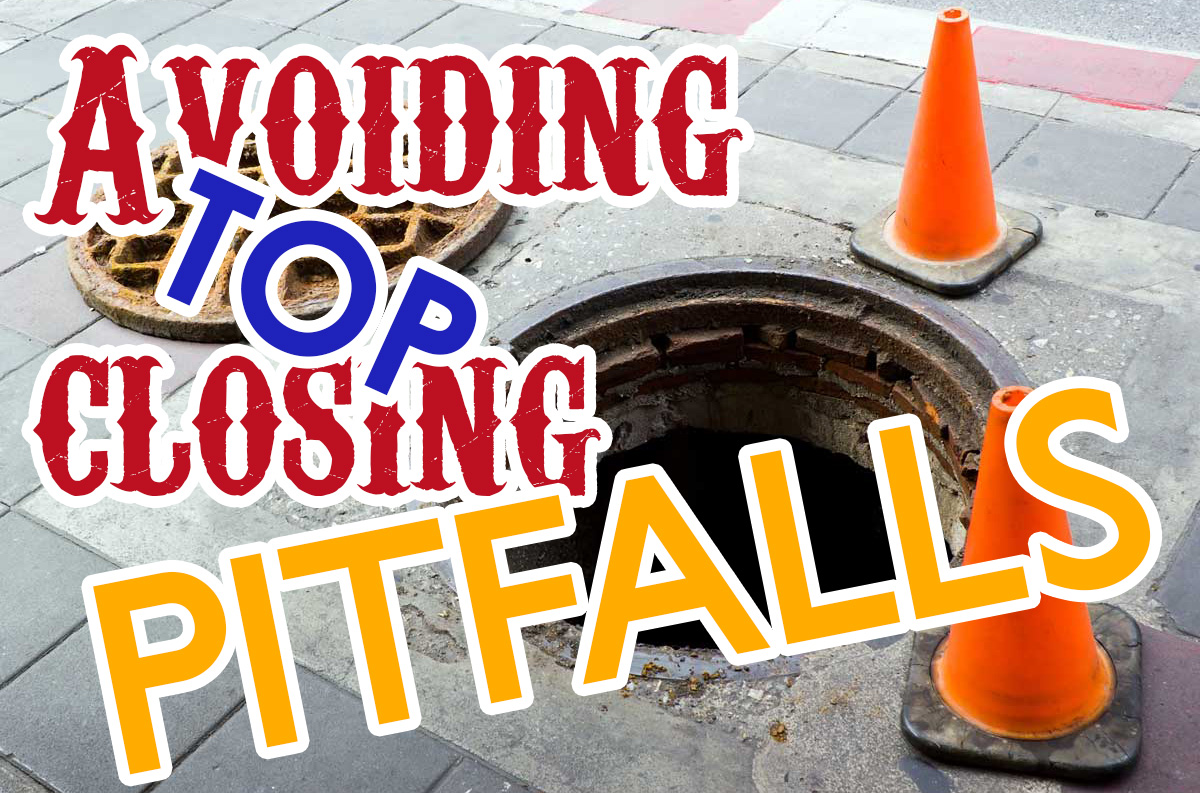 Takeaways
Takeaways
- Don’t count your chickens ’til they’ve hatched. (Buyer=Chicken, Closed=Hatched).
- The seller doesn’t have control of the road to closing, but they can take steps to protect themselves.
- Be proactive in getting the buyer, your agent, and the title company all the information and documents they need.
As the Seller, you have no “out” on the contract. Only if a buyer defaults or terminates a contract can you get out. For that reason, sellers are somewhat at the mercy of they buyer once a contract begins. Will the buyer find issues in the inspection? Will they be able to get their financing approved? Will they simply change their minds?
These are risks the seller has little control over, and that can derail the train to closing. However, you can anticipate and prepare for or even prevent issues from arising.
Home Inspection
The inspection is probably the most common reason a buyer will walk away from a contract.
Buyers have an option period that is negotiable in the contract. The option period is the key period for a buyer’s due diligence. A seller doesn’t have to agree to any repairs the buyer asks for, but the buyer’s leverage is that they can walk away.
Risk Reduction Measures
- Complete the Seller’s Disclosure accurately and completely. It’s better a buyer find out about defects early rather than later and waste your time.
- Get your insurance adjuster to review your roof before even listing your home.
- Purchase a home warranty that may cover damage revealed in the inspection, or damage that may occur after the inspection and before closing
Financing Falls Through
This is an especially frustrating event for a seller because they have so little control over it, AND it often happens late in the process – usually several weeks in.
If within the loan contingency timeline on a third party financing addendum, the buyer also gets their earnest money back, leaving the seller with about nothing for their time off the market.
Risk Reduction Measures
- Review the buyer’s preapproval before countering or accepting an offer
- Ask for more earnest money if a closing is a long time out
- Remind buyer when the loan contingency expires and ensure their financing is good (or they likely lose their earnest money)
Low Appraisal
Appraisers can be the bane of Realtors. If an appraisal comes in low, either the buyer has to pay the difference out of pocket (not an option for many buyers), the seller has to lower the price to the appraisal, or the buyer and seller can meet halfway. If both parties can’t agree to any of those courses of action, the buyer can sometimes walk away, depending on their financing.
Risk Reduction Measures
- Have recent comparable sales ready, even in a binder in the house, that support your purchase price for when the appraiser walks through.
- Be sure to mention to the appraiser any upgrades or improvements that have been made to the house or that they might otherwise miss.
Title Issues
Some title issues are small – a $100 lien from the city for mowing the grass, for example. Others are huge and can prevent you from selling the home for months if not longer.
Title issues are essentially the seller’s problem. If you cannot close on by the closing date in the contract because of title issues, the buyer often has the right to walk away with their earnest money. Because some title issues can take a long time, buyers needing housing soon may decide to try again with another homeowner instead of wait possibly months for you to get your title issues figured out.
Risk Reduction Measures
- Start your title search with a title company as soon as you’re on the market, even before a contract. That way you can discover any issues early, with time to remedy them. You can request the buyer use that title company in their offer, since the title company has a head start on your transaction.
- Immediately disclose all liens and payoffs on the property to the title company.
Repairs Incomplete
Sometimes a seller. Normally, a buyer will find out about these during the final walk through, usually a few days before closing, but sometimes even the day of closing. That is a painful time for something to suddenly come up, requiring either some very prompt action or a delay in closing.
Risk Reduction Measures
- Escrow funds, if acceptable to the buyer, lender and title company, to the repairmen to complete after closing. That way any agreed upon repairs do not impact the closing.
- Give the buyer copies of all the paid repair invoices to demonstrate that the work was completed.
- Remember that repairs, per the contract, cannot by DIY but must be by licensed/ professional contractors or repairmen.
- Be careful when moving not to damage anything on your way out!
Buyer Gets Cold Feet
If the buyer simply changes their mind during the option period, all they lose is their option fee. If they change their mind later than that, they should lose their earnest money unless they find a valid excuse in the contract for terminating. There is nothing a seller can do keep a buyer from changing their mind. But a seller can at least get paid for the inconvenience in the form of earnest money and option fees.
Risk Reduction Measures
- Request a reasonable amount of earnest money. $500 is common in the Fort Hood area, but more is not unusual. Sometimes 1% of the purchase price, or an amount equal to what you’re paying in mortgage payments while under contract.
- Request a reasonable amount for an option fee for the privilege of taking the property off the market one to two weeks. $50-$100 is most common in the Fort Hood area.
- Negotiate a reasonable option period length. 1 to 2 weeks is common.
Unprepared for Closing
Closing day isn’t a fun day to discover problems. Hopefully you are getting money back as a seller after everyone is paid, but often a seller may owe money.
Note – even if just one spouse is on the loan paperwork, Texas is a community property state, meaning your spouse needs to be on hand when signing.
Risk Reduction Measures
- Be sure your agent has a copy of your most recent mortgage payoff so they know if you will be receiving or paying money at closing, and approximately how much.
- Be sure you’ve reviewed your Closing Disclosure (CD) and have wired the money or have a cashiers check ready for the title company if you owe money for closing.
- Bring your spouse to closing! (and IDs)
- Get the title company the information they need to close, including whether it is going to be a mail-out/mobile notary for sellers out of the area, power of attorney documents if applicable, corporate documents like LLC Resolutions if applicable, and all contract amendments as soon as you have them.
Conclusion
Unfortunately I don’t know of a way of searching how many Fort Hood deals fall out of contract. From my experience, probably about 25-30% fall out of contract at least once, usually for one of the above reasons. Falling out costs the seller time, and time is money.
Understand that you as the seller don’t have complete control over the buyer and cannot guarantee that an executed contract closes. But if you take the above risk mitigation steps, hopefully you will be well on your way to avoiding problems or dealing with them as painlessly as possible should they arise.
Brian E Adams, REALTOR®
I am a real estate agent in the Fort Hood area, with StarPointe Realty. Contact me for help buying and selling in Central Texas!

